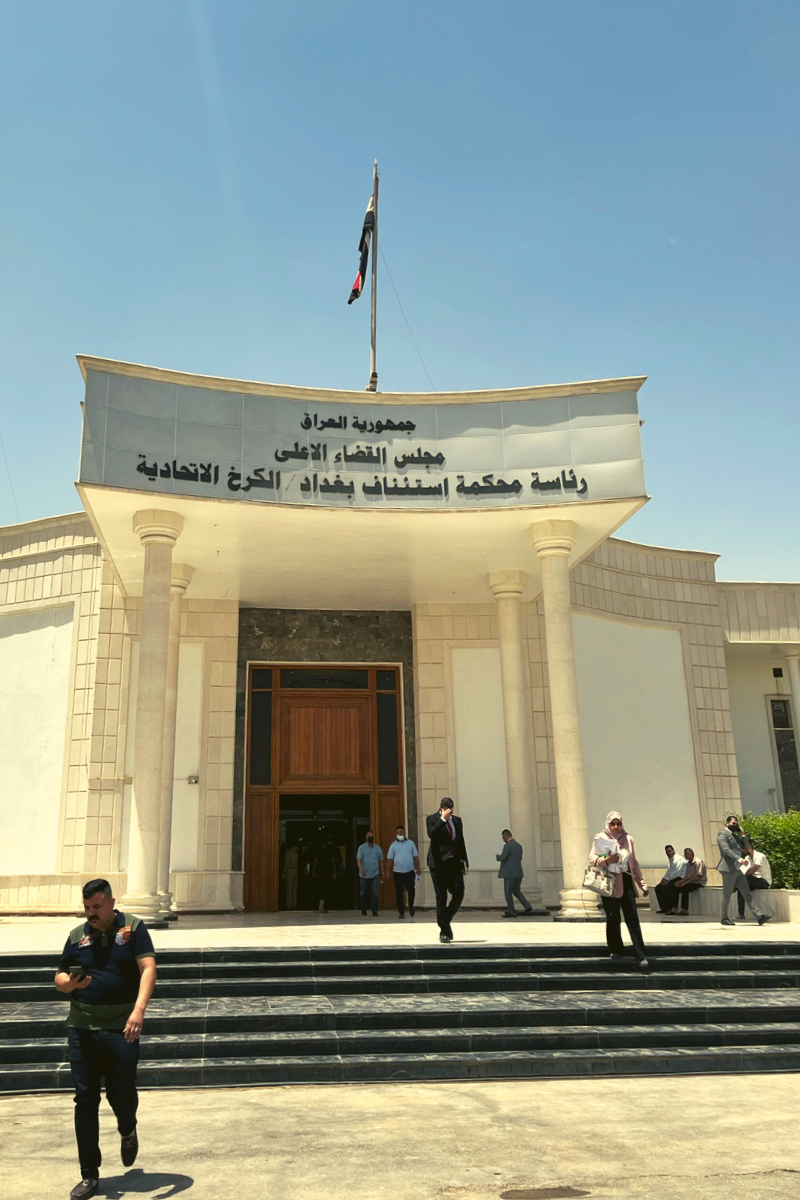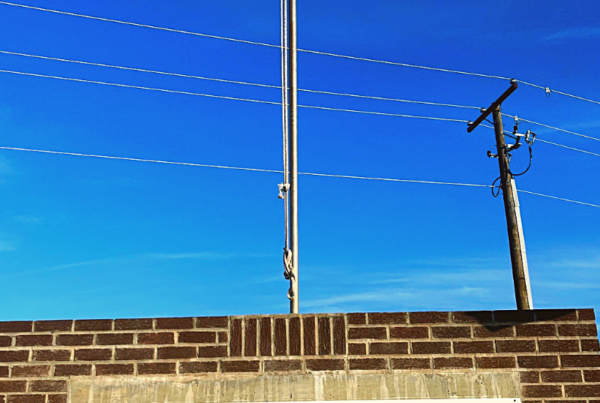BAGHDAD, Iraq – In a quiet office wedged deep inside a bustling Baghdad courthouse, glints of burning sunlight frame a silky black judge’s robe hung beside a limp Iraqi flag. The large wooden desk is neat and sparse, adorned with a tin of designer pens and stacks of paper encased in thick leather sleeves. Behind it sits Judge al-Hussein Chfat al-Tameemi – his clean-shaven, almost porcelain face creased with deep thoughts as he combs through seemingly endless papers.
“Our experience has increased through the years. We have had a lot of terrorism attacks through the years,” Tameemi, a 39-year-old investigative judge tells me with a sigh. “We’ve accumulated a lot of experience; we know how to gather plenty of additional evidence to indict. But, especially since 2014, we don’t go into a trial until we are sure we have enough evidence to prosecute.”
2014 was the ominous year that ISIS stormed through the war-weary streets of Iraq, taking swaths of land and lives in its wake. Over the rocky course of almost two decades, Tameemi continues, Iraqis have developed a lengthy database of suspects and produced detailed research on how the various terror factions interact and communicate.
But for this top Judge, it is a job that feels as though it will never really be over. It is business as usual. Soldiers and sometimes civilians are still dying every week. They are dying in shootouts from a car bomb on their way to work, in sudden ambushes in places like Kirkuk and along the abrasive western border as sleeper cells come to life.

Thousands of prisoners accused of belonging to ISIS remain in custody inside the war-recovering country. But five years since the brutal terrorist outfit was declared territorially defeated, the numbers awaiting trial continue to ascend. Further, the Iraqi government continues to arrest and try more suspects: members of ISIS are still waging guerilla-style attacks in the remote western province of Anbar, and Iraqis detained in Syria with Iraqi citizenship are being transported back through the Rabia crossing to face the full force of the law at home.
However, due process under the Iraqi counterterrorism justice system is a complicated procedure that has garnered much criticism since the self-declared Caliphate came to a crushing end in the early summer of 2017. Human rights advocates, including the United Nations, have lamented the process as farcical – replete with trials that last just a few minutes, centered on confessions made under the duress of torture, often culminating in a death sentence.
“Our doors are open for human rights international organizations and the Red Crescent,” Tameemi contends, more matter-of-factly than defensively.
Indeed, the outside critical eye isn’t how the likes of this judge – and much of the fed-up Iraqi population who lost countless lives and limbs throughout the bitter war – view the situation. Tameemi points to fat folders, laying out individual cases on which he has been probing and collecting evidence for more than a year. The number of ISIS cases he has been tasked with procuring ahead of trial is now well into the thousands, although he has lost count of exact numbers.
Roughly what percentage of those trialed on terrorism charges has been found not guilty?
“Just to be clear, we don’t arrest someone just because maybe he’s ISIS,” Tameemi says, giving me a level look. “We have the proof. In some cases, people are arrested. But if the evidence is insufficient, they are released.”
What outsiders often fail to comprehend, Tameemi asserts, is the level of investigation that goes into each case before they stand trial. First, his team combs the database, internet, and groups for pictures, videos, and messages. All branches of the Security Forces, from the Defense Ministry to the National Intelligence and the Coalition Forces, share intelligence. Next, they collect testimonies from witnesses, survivors, and victims.
“For example, we have their (ISIS) payroll, their members’ names, their salary, and their rank,” Tameemi continues. “Remember, this was not a secret group. They announced themselves. They issued videos of beheadings and assassinations, and explosions on their channels. Especially in the last battles, many ran out of ammunition and surrendered themselves.”
Before 2014, such extremists – often belonging to shadowy groups like al-Qaeda – operated in secret. Then, ISIS changed the game, perceiving itself as a cohesive network, a legitimate government.
Yet legitimacy, the slow restoration of faith in accountability judicial institutions in Iraq, can only be clawed back bit by bit, case by case.
Tameemi possesses a strangely precise memory for cases, for every permutation over the years of a delving into the darkness. He plucks out a file dedicated to a current case concerning an ISIS leader, a now-jailed ISIS Finance Minister in Mosul in charge of oil fields and selling oil at the group’s behest. Tameemi rattles off explicit times, dates, key moments, duties, and the subject’s history without even looking.
In essence, the judge conveys the message that before an ISIS suspect is shuffled off to the stand, the case against them is foolproof.
Defendants can find their own lawyers, refuse to hire an attorney, or the court may appoint one for them. Nevertheless, for any lawyer who takes on such a challenging task, there is a danger that hangs over them from Shia militias and mourning victims. Most are forced to say very little in defense of their clients so as to not be exposed to the wrath.
“The trials are very quick, maybe ten minutes at most and they are found guilty. Then, occasionally, there is an objection, and the case is sent back to the investigator for further development,” one court observer tells me later that afternoon. “Most of them are given death sentences, especially if there is proof like a photo of them carrying a weapon or standing with other ISIS fighters. But if they were just members, not part of the fighting, like a cook – they get fifteen or twenty years. From what I have seen, judges almost always give them the full 20 years.”
Others on the streets of Baghdad tell me there is no room for reconciliation, that innocent lives are at stake, and convey an adamantly pro-death penalty stance.
“They (ISIS) might say they regret their actions. But these types of people cannot be trusted,” a young woman whispers in clipped English from the coffee bar of a popular hotel. “They wouldn’t hesitate to kill anyone they see as an infidel the moment they are released. We cannot accept this risk. Executions are the only deterrent.”
Some ordinary Iraqis I speak to articulate sympathy for the women – the ISIS wives – losing decades of their lives.
“I’m angry at them, but I feel for them,” an Iraqi friend says. “Because in our culture, women follow the men. That’s what religious teachings tell them to do. So how can you blame a woman because her husband was ISIS? The men should be executed, but if the woman did not harm other people, is this fair?”
Despite the relative harmony that now permeates the Baghdad air, it remains a nation still suffering the terrible fallout of a sectarian conflict and civilians caught in the crossfire of death and destruction. I asked the judge if any suspects appeared remorseful or apologized for their actions. The first wave of ISIS, Tameemi explains, were all adults who did not regret what they did.
“They were the true believers; they were not sorry. But the people who joined later, more youth who followed the propaganda, or the money or were forced to join, some look back and disagree with what they did,” he notes. “Remorse does make a difference with their sentence. They might get 20 years instead of the death penalty.”
Scores of death penalty convictions – typically by hanging – have already been carried out. But as public pressure from concerned human rights watchdogs grows, the number has slowed to a trickle. The lack of carrying out capital punishment has angered some who halted their lives to fight against the ISIS explosion, which at its peak controlled more than a third of the country, including its second-largest city, Mosul.
“The death penalty is fair because they killed a lot of people. But I have a problem with the government because they are not executing and want to urge them to perform the death penalty,” Ryan al-Kildini, a Christian member of parliament and former PMU fighter, tells me on another day.
“This needs to be fast-tracked. Why are we wasting time keeping them in prison?”
Still, Tameemi endures many sleepless nights worrying about what will come next, as if stalked by death and onslaught. The war will churn on.
As Iraq fails to form a cohesive government more than seven months since their federal elections, vestiges of ISIS have re-grouped into a violent insurgency reliant upon ambushing security forces, slaying suspected snitches, and extorting money from the defenseless through kidnapping and threats of execution. Sleeper cells are evident along the porous Iraqi Syrian border, allowing the outfit to wage asymmetric attacks intent on destabilizing a conflict-jaded and trauma-struck society.
Tameemi views the somewhat stagnant lawlessness inside neighboring Syria as to why ISIS remains a mammoth threat, drawing attention to the sprawling al-Hol camp that languishes in the purgatory of northeast Syria.
Under the guise of the U.S.-backed Syrian Democratic Forces (SDF), it serves as the dilapidated home for more than 60,000 of the apprehended and displaced, including many foreign wives and children of ISIS fighters. It is a steamy breeding ground for the continued extremist ideology, a kind of hopeless place whereby murders continue to run rampant and internal security forces still routinely make arrests of those possessing ISIS ties.
In addition, the jails on the Syrian side remain deeply problematic. Earlier this year, ISIS operatives on the inside set fire to one of the prisons. Those on the outside corroborated by opening fire and setting off car bombs, enabling upwards of 500 detainees to escape. But given that the SDF itself is not a government, and much of the international community does not have diplomatic relations with Syrian dictator Bashar al-Assad, the situation – from the rampant displacement camps to the overstuffed prisons – has reached a chilling standstill akin to a ticking time bomb.
“The international community is not focused or paying attention. It seems they can only handle one issue at a time,” Tameemi claims, hinting at the laser focus on the war in Ukraine. “We have 4000 ISIS detainees in Syria. Their legal cases are not resolved. And 39,000 men, women, and children in Syrian camps. The children are being trained with this ideology, the terrorist narrative.”
He also asserts that Idlib – the last rebel holdout against the Assad regime largely controlled by al-Qaeda affiliate HTS – is a terrorist haven for ISIS leaders.
“I believe that within 10 years, another organization will emerge that will be more dangerous than ISIS,” Tameemi cautions. “This will be a big threat to the Middle East, North Africa, the world.”
There are more than 60 nationalities represented in Syria’s jails and camps: alleged ISIS members and their wives are among them. While a spattering of foreign governments has steadily taken back their citizens to face the wrath of the law on home turf, many have refused to do so, primarily because they may not have sufficient evidence to meet the prosecution standards, and thus they would be set free.
The judge stresses that the SDF is not a recognized government with the means to dole out sentences and that Iraq alone cannot handle the overwhelming affliction.
“There has to be true will from the international community, starting with separating children from their mothers and putting them into a proper atmosphere for rehabilitation,” Tameemi advises. “And the detainees must be properly prosecuted and put into proper prisons under international supervision. It may be that there needs to be coordinated international courts. These trials must be handled properly to avoid a terrorist wave in the future.”
Yet, according to Tameemi, this encumbrance damages Iraq’s ability to find its future footing. Still, he won’t walk away even though it means a persistent drumbeat of threats, weeks or even months on end, without seeing his wife and four young children, his nights and days instead are devoted to hunting down the worst of the worst.
Tameemi emphasizes that, personally, he is opposed to the death penalty preferring life imprisonment, but this issue is not one for him to comment on. Instead, he points to a small silver lining which emanated from the U.S. occupation – the opportunity to reform the judiciary. Although imperfect, Tameemi acknowledges it’s a significant step forward.
“Before 2003, we were under dictatorship. The judiciary was not independent. Then we were under the CPA,” he recounts. “It was after 2017 that we truly got our full independence from the government.”
Nonetheless, the judge’s long-term goals are loftier than just putting terrorists away.
“I want to reach the crime before it happens,” Tameemi adds. “That would be the real achievement, to stop something before it can cause more victims.”






